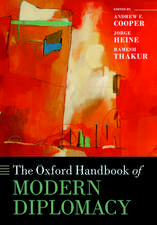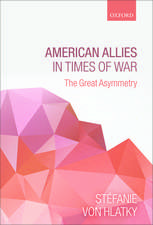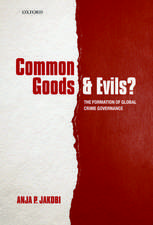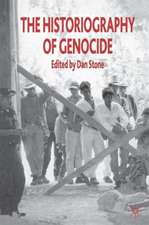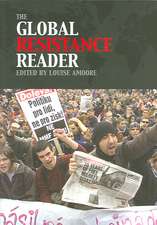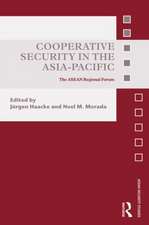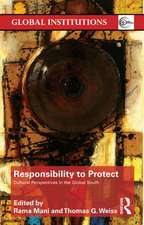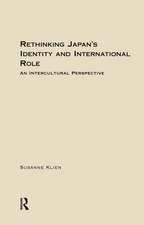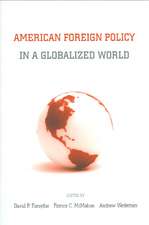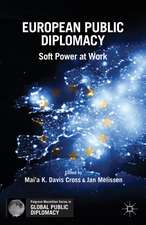Genocide: SAGE Library of International Relations
Editat de Adam Jonesen Limba Engleză Hardback – 8 dec 2008
They also include a full introduction, presenting a rationale for the selection and mapping out the discipline's past, present and likely future.
This series is designed to be a 'gold standard' for university libraries throughout the world with an interest in International Relations.
This four-volume set provides a comprehensive collection of classic and contemporary works on genocide sourced from a wide range of disciplines including international relations, international law, anthropology, psychology, history and sociology.
Volume I highlights the legal framings of genocide and deploys some of the key theoretical contributions of the academic field of comparative genocide studies.
Volume II seeks to provide both an empirical and an argumentative survey of key genocides in human history, particularly those of the modern period.
Volume III focuses on the rich debates over human beings' agency in genocide, and the political, psychological, sociological, and anthropological perspectives that illuminate it.
Volume IV explores diverse strategies of genocide prevention, and the spirited debate over humanitarian intervention and post-genocide peace building and restitution.
| Toate formatele și edițiile | Preț | Express |
|---|---|---|
| Paperback (2) | 369.37 lei 3-5 săpt. | +69.07 lei 5-11 zile |
| Taylor & Francis – 12 dec 2023 | 369.37 lei 3-5 săpt. | +69.07 lei 5-11 zile |
| Taylor & Francis – 19 dec 2016 | 449.17 lei 3-5 săpt. | +57.72 lei 5-11 zile |
| Hardback (2) | 793.10 lei 6-8 săpt. | |
| Taylor & Francis – 12 dec 2023 | 793.10 lei 6-8 săpt. | |
| Taylor & Francis – 19 ian 2017 | 1039.69 lei 6-8 săpt. |
Din seria SAGE Library of International Relations
- 14%
 Preț: 5404.08 lei
Preț: 5404.08 lei - 9%
 Preț: 6350.93 lei
Preț: 6350.93 lei - 26%
 Preț: 5444.55 lei
Preț: 5444.55 lei - 26%
 Preț: 5094.75 lei
Preț: 5094.75 lei - 26%
 Preț: 4936.58 lei
Preț: 4936.58 lei - 26%
 Preț: 6807.83 lei
Preț: 6807.83 lei - 26%
 Preț: 5826.63 lei
Preț: 5826.63 lei - 11%
 Preț: 4551.41 lei
Preț: 4551.41 lei - 26%
 Preț: 4939.62 lei
Preț: 4939.62 lei - 16%
 Preț: 5259.50 lei
Preț: 5259.50 lei - 26%
 Preț: 4940.23 lei
Preț: 4940.23 lei - 16%
 Preț: 3906.67 lei
Preț: 3906.67 lei - 16%
 Preț: 5251.65 lei
Preț: 5251.65 lei - 16%
 Preț: 5251.10 lei
Preț: 5251.10 lei - 11%
 Preț: 5253.08 lei
Preț: 5253.08 lei - 11%
 Preț: 5252.10 lei
Preț: 5252.10 lei - 11%
 Preț: 7247.29 lei
Preț: 7247.29 lei - 11%
 Preț: 5253.31 lei
Preț: 5253.31 lei - 26%
 Preț: 4940.15 lei
Preț: 4940.15 lei - 26%
 Preț: 4942.17 lei
Preț: 4942.17 lei - 26%
 Preț: 4941.74 lei
Preț: 4941.74 lei - 11%
 Preț: 5253.21 lei
Preț: 5253.21 lei - 11%
 Preț: 4547.40 lei
Preț: 4547.40 lei - 16%
 Preț: 5513.72 lei
Preț: 5513.72 lei - 26%
 Preț: 5189.04 lei
Preț: 5189.04 lei - 26%
 Preț: 5442.48 lei
Preț: 5442.48 lei - 11%
 Preț: 5513.61 lei
Preț: 5513.61 lei - 26%
 Preț: 5190.16 lei
Preț: 5190.16 lei - 26%
 Preț: 9216.17 lei
Preț: 9216.17 lei - 26%
 Preț: 8804.18 lei
Preț: 8804.18 lei - 26%
 Preț: 5092.91 lei
Preț: 5092.91 lei - 26%
 Preț: 5094.93 lei
Preț: 5094.93 lei
Preț: 5252.14 lei
Preț vechi: 6283.75 lei
-16% Nou
Puncte Express: 7878
Preț estimativ în valută:
1005.13€ • 1045.49$ • 829.79£
1005.13€ • 1045.49$ • 829.79£
Carte indisponibilă temporar
Doresc să fiu notificat când acest titlu va fi disponibil:
Se trimite...
Preluare comenzi: 021 569.72.76
Specificații
ISBN-13: 9781847870223
ISBN-10: 1847870228
Pagini: 1664
Dimensiuni: 156 x 234 mm
Greutate: 0 kg
Ediția:Four-Volume Set
Editura: SAGE Publications
Colecția Sage Publications Ltd
Seria SAGE Library of International Relations
Locul publicării:London, United Kingdom
ISBN-10: 1847870228
Pagini: 1664
Dimensiuni: 156 x 234 mm
Greutate: 0 kg
Ediția:Four-Volume Set
Editura: SAGE Publications
Colecția Sage Publications Ltd
Seria SAGE Library of International Relations
Locul publicării:London, United Kingdom
Cuprins
Volume 1: Genocide in Theory and Law
Genocide - Raphael Lemkin
Origins of the Legal Prohibition of Genocide - William A. Schabas
Convention on the Prevention and Punishment of Crime of Genocide - United Nations
The Crime of State: Penal protection for fundamental freedoms of persons and people - Pieter Drost
Revised and Updated Report on the Question of the Prevention and Punishment of the Crime of Genocide - Benjamin Whitaker
Intent without Intent - John Quigley
The Genocidal State: An overview - Leo Kuper
What is Genocide? - Kurt Jonassohn
Elements of Genocidal Conflict: Social Groups, Social Destruction and War, - Martin Shaw
A Typology of Genocide - Vahakn N. Dadrian
Eight Stages of Genocide - Gregory H. Stanton
Genocide as a Form of War - Martin Shaw
Revolution and Genocide - Robert Melson
Power, Genocide and Mass Murder - R.J. Rummel
Mass Killing and Genocide - Benjamin A. Valentino
The Dark Side of Democracy: The Modern Tradition of Ethnic and Political Cleansing - Michael Mann
The Birth of the Ostland out of the Spirit of Colonialism: A Postcolonial Perspective on the Nazi Policy of Conquest and extermination - Jurgen Zimmerer
Why Is the Twentieth Century the Century of Genocide? - Mark Levene
Genocide and Anthropology - Alexander Laban Hinton
Toward a Vocabulary of Massacre and Genocide - Jacques Semelin
No Lessons Learned from the Holocaust? Assessing Risks of Genocide and Political Mass Murder since 1955 - Barbara Harff
Rape, Genocide, and Women's Human Rights - Catharine A. MacKinnon
The Genocidal Continuum: Peace-time Crimes - Nancy Scheper-Hughes
On Suffering and Structural Violence: A view from below - Paul Farmer
Volume 2: Genocide in History
On Cases from Antiquity and Melos - Frank Chalk and Kurt Jonassohn
The First Genocide: Carthage, 146 BC - Ben Kiernan
The Conquest of America - Tzvetan Todorov
The Vendée - A Paradigm Shift? - Mark Levene
The Zulu Kingdom as a Genocidal and Post-genocidal Society, c. 1810 to the Present - Michael R. Mahoney
Patterns of Frontier Genocide, 1803-1910: The Aboriginal Tasmanians, the Yuki of California, and the herero of Namibia - Benjamin Madley
Relations of Genocide in U.S. History - Tony Barta
The Question of Genocide in U.S. History - Jeffrey C. Ostler
Red Rubber: The story of the rubber slave trade flourishing on the Congo in the year of grace - E.D. Morel
A Reckoning - Adam Hochschild
Rethinking the Unthinkable: Toward an understanding of the Armenian genocide - Ronald Grigor Suny
'Kill All, Burn All, Loot All': The Nanking Massacre of December 1937 and Japanese policy in China - Callum MacDonald
Precedents - Raul Hilberg
The Death Factory - Wolfgang Sofsky
The Uniqueness of the Holocaust: The historical dimension - Steven T. Katz
Uniqueness as Denial: The politics of genocide scholarship - David Stannard
The National Socialist Solution of the Gypsy Question - Michael Zimmermann
Genocide in Bangladesh - Rounaq Jahan
The Cambodian Genocide - 1975-1979 - Ben Kiernan
Distinguishing Genocide from War Crimes: Vietnam and Afghanistan re-examined - Helen Fein
Introduction - Human Rights Watch
Genocide in Bosnia and Herzegovina - Eric Marjusen and Martin Mennecke
Introduction - Alison Des Forges
Disconnecting the Threads: Rwanda and the holocaust reconsidered - René Lemarchand
Volume 3: Perpetrators, Victims, Bystanders, Rescuers
Eichmann in Jerusalem: A report on the banality of evil - Hannah Arendt
The Psychology of Bystanders, Perpetrators, and Heroic Helpers - Ervin Staub
Lethal Cogs - Alex Alvarez
Killers of Conviction: Groups, ideology, and extraordinary evil - James Waller
The Dilemma of Obedience - Stanley Milgram
Interpersonal Dynamics in a Simulated Prison - Craig Haney, Curtis Banks and Philip Zimbardo
Ordinary Men - Christopher R. Browning
Explaining the Perpetrators' Actions: Assessing the competing explanations - Daniel Jonah Goldhagen
German Soldiers and the Holocaust: Historiography, research and implications - Omer Bartov
The Uniqueness and Normality of the Holocaust - Zygmunt Bauman
The Gray Zone - Primo Levi
Learning from Nazi Genocide - Robert Jay Lifton and Eric Markusen
A Head for an Eye: Revenge in the Cambodian genocide - Alexander Laban Hinton
Conclusion - Scott Straus
Middleman Minorities and Genocide - Walter P. Zenner
The Dialectics of Hate and Desire: Tutsi women and Hutu extremism - Christopher C. Taylor
Gendercide and Genocide - Adam Jones
Surfacing Children: Limitations of genocidal rape discourse - R. Charli Carpenter
Moral Heroism and Extensivity - Samuel P. Oliner and Pearl M. Oliner
Whoever Saves a Single Life - Emmy E. Werner
Volume 4: Prevention, Intervention, and Accountability
The Challenge of Genocide and Genocidal Politics in an Era of Globalisation - Richard Falk
The Sovereign Territorial State: The right to genocide - Leo Kuper
The United States and Genocide Law: A history of ambivalence - Samantha Power
Bystanders to Genocide: Why the United States let the Rwandan genocide happen - Samantha Power
'Some People and not Others' and 'Ethics Humanized' - Jonathan Glover
Reflections on how Genocidal Killings are Brought to an End - Alex de Waal and Bridget Conley-Zilkic
A New Approach: 'The Responsibility to Protect' and 'The Operational Dimension' - International Commission on Intervention and State Sovereignty
Arguing for Humanitarian Intervention - Michael Walzer
Humanitarian Intervention and International Society - Nicholas J. Wheeler
East Timor and the New Humanitarian Interventionism - Nicholas J. Wheeler and Tim Dunne
Military Expedients against Genocide - John G. Heidenrich
An International Peace Army: A proposal for the long-range future - Israel W. Charny
Looking Away - Stephen Holmes
Suicidal Rebellions and the Moral Hazard of Humanitarian Intervention - Alan J. Kuperman
Vengeance and Forgiveness - Martha Minow
The Quest for Justice - Aryeh Neier
On the Hazards of Foreign Travel for Dictators and Other International Criminals - Marc Weller
Institutional Responses to Genocide and Mass Atrocity - Ernesto Verdeja
International Citizens' Tribunals on Human Rights - Arthur Jay Klinghoffer
The Psychology and Politics of Genocide Denial: A comparison of four case studies - Henry R. Huttenbach
Leaving the Past Alone - Priscilla B. Hayner
The Politics of Apology - Colin Tatz
Toward a Theory of Restitution - Elazar Barkan
Genocide - Raphael Lemkin
Origins of the Legal Prohibition of Genocide - William A. Schabas
Convention on the Prevention and Punishment of Crime of Genocide - United Nations
The Crime of State: Penal protection for fundamental freedoms of persons and people - Pieter Drost
Revised and Updated Report on the Question of the Prevention and Punishment of the Crime of Genocide - Benjamin Whitaker
Intent without Intent - John Quigley
The Genocidal State: An overview - Leo Kuper
What is Genocide? - Kurt Jonassohn
Elements of Genocidal Conflict: Social Groups, Social Destruction and War, - Martin Shaw
A Typology of Genocide - Vahakn N. Dadrian
Eight Stages of Genocide - Gregory H. Stanton
Genocide as a Form of War - Martin Shaw
Revolution and Genocide - Robert Melson
Power, Genocide and Mass Murder - R.J. Rummel
Mass Killing and Genocide - Benjamin A. Valentino
The Dark Side of Democracy: The Modern Tradition of Ethnic and Political Cleansing - Michael Mann
The Birth of the Ostland out of the Spirit of Colonialism: A Postcolonial Perspective on the Nazi Policy of Conquest and extermination - Jurgen Zimmerer
Why Is the Twentieth Century the Century of Genocide? - Mark Levene
Genocide and Anthropology - Alexander Laban Hinton
Toward a Vocabulary of Massacre and Genocide - Jacques Semelin
No Lessons Learned from the Holocaust? Assessing Risks of Genocide and Political Mass Murder since 1955 - Barbara Harff
Rape, Genocide, and Women's Human Rights - Catharine A. MacKinnon
The Genocidal Continuum: Peace-time Crimes - Nancy Scheper-Hughes
On Suffering and Structural Violence: A view from below - Paul Farmer
Volume 2: Genocide in History
On Cases from Antiquity and Melos - Frank Chalk and Kurt Jonassohn
The First Genocide: Carthage, 146 BC - Ben Kiernan
The Conquest of America - Tzvetan Todorov
The Vendée - A Paradigm Shift? - Mark Levene
The Zulu Kingdom as a Genocidal and Post-genocidal Society, c. 1810 to the Present - Michael R. Mahoney
Patterns of Frontier Genocide, 1803-1910: The Aboriginal Tasmanians, the Yuki of California, and the herero of Namibia - Benjamin Madley
Relations of Genocide in U.S. History - Tony Barta
The Question of Genocide in U.S. History - Jeffrey C. Ostler
Red Rubber: The story of the rubber slave trade flourishing on the Congo in the year of grace - E.D. Morel
A Reckoning - Adam Hochschild
Rethinking the Unthinkable: Toward an understanding of the Armenian genocide - Ronald Grigor Suny
'Kill All, Burn All, Loot All': The Nanking Massacre of December 1937 and Japanese policy in China - Callum MacDonald
Precedents - Raul Hilberg
The Death Factory - Wolfgang Sofsky
The Uniqueness of the Holocaust: The historical dimension - Steven T. Katz
Uniqueness as Denial: The politics of genocide scholarship - David Stannard
The National Socialist Solution of the Gypsy Question - Michael Zimmermann
Genocide in Bangladesh - Rounaq Jahan
The Cambodian Genocide - 1975-1979 - Ben Kiernan
Distinguishing Genocide from War Crimes: Vietnam and Afghanistan re-examined - Helen Fein
Introduction - Human Rights Watch
Genocide in Bosnia and Herzegovina - Eric Marjusen and Martin Mennecke
Introduction - Alison Des Forges
Disconnecting the Threads: Rwanda and the holocaust reconsidered - René Lemarchand
Volume 3: Perpetrators, Victims, Bystanders, Rescuers
Eichmann in Jerusalem: A report on the banality of evil - Hannah Arendt
The Psychology of Bystanders, Perpetrators, and Heroic Helpers - Ervin Staub
Lethal Cogs - Alex Alvarez
Killers of Conviction: Groups, ideology, and extraordinary evil - James Waller
The Dilemma of Obedience - Stanley Milgram
Interpersonal Dynamics in a Simulated Prison - Craig Haney, Curtis Banks and Philip Zimbardo
Ordinary Men - Christopher R. Browning
Explaining the Perpetrators' Actions: Assessing the competing explanations - Daniel Jonah Goldhagen
German Soldiers and the Holocaust: Historiography, research and implications - Omer Bartov
The Uniqueness and Normality of the Holocaust - Zygmunt Bauman
The Gray Zone - Primo Levi
Learning from Nazi Genocide - Robert Jay Lifton and Eric Markusen
A Head for an Eye: Revenge in the Cambodian genocide - Alexander Laban Hinton
Conclusion - Scott Straus
Middleman Minorities and Genocide - Walter P. Zenner
The Dialectics of Hate and Desire: Tutsi women and Hutu extremism - Christopher C. Taylor
Gendercide and Genocide - Adam Jones
Surfacing Children: Limitations of genocidal rape discourse - R. Charli Carpenter
Moral Heroism and Extensivity - Samuel P. Oliner and Pearl M. Oliner
Whoever Saves a Single Life - Emmy E. Werner
Volume 4: Prevention, Intervention, and Accountability
The Challenge of Genocide and Genocidal Politics in an Era of Globalisation - Richard Falk
The Sovereign Territorial State: The right to genocide - Leo Kuper
The United States and Genocide Law: A history of ambivalence - Samantha Power
Bystanders to Genocide: Why the United States let the Rwandan genocide happen - Samantha Power
'Some People and not Others' and 'Ethics Humanized' - Jonathan Glover
Reflections on how Genocidal Killings are Brought to an End - Alex de Waal and Bridget Conley-Zilkic
A New Approach: 'The Responsibility to Protect' and 'The Operational Dimension' - International Commission on Intervention and State Sovereignty
Arguing for Humanitarian Intervention - Michael Walzer
Humanitarian Intervention and International Society - Nicholas J. Wheeler
East Timor and the New Humanitarian Interventionism - Nicholas J. Wheeler and Tim Dunne
Military Expedients against Genocide - John G. Heidenrich
An International Peace Army: A proposal for the long-range future - Israel W. Charny
Looking Away - Stephen Holmes
Suicidal Rebellions and the Moral Hazard of Humanitarian Intervention - Alan J. Kuperman
Vengeance and Forgiveness - Martha Minow
The Quest for Justice - Aryeh Neier
On the Hazards of Foreign Travel for Dictators and Other International Criminals - Marc Weller
Institutional Responses to Genocide and Mass Atrocity - Ernesto Verdeja
International Citizens' Tribunals on Human Rights - Arthur Jay Klinghoffer
The Psychology and Politics of Genocide Denial: A comparison of four case studies - Henry R. Huttenbach
Leaving the Past Alone - Priscilla B. Hayner
The Politics of Apology - Colin Tatz
Toward a Theory of Restitution - Elazar Barkan
Descriere
This four volumes will provide a reference collection, for libraries and research institutes, of classic and contemporary works on comparative genocide studies
Notă biografică
Adam Jones, PhD, was born in Singapore in 1963 and grew up in England and Canada. He is currently Professor of Political Science at the University of British Columbia–Okanagan in Kelowna, BC. He has published various sole-authored and edited books on genocide and related themes, including Sites of Genocide (2022) and The Scourge of Genocide: Essays and Reflections (2013), as well as works on mass media and political transition. Jones has lived and/or traveled in over 100 countries on every populated continent. His "Global Photo Archive" of more than 26,000 Creative Commons images has been used online by The New York Times, The Washington Post, the BBC, The Guardian, and The Atlantic, among many others (see www.flickr.com/adam_jones/albums/). He has served as an expert consultant for the United Nations Office of the Special Adviser on Genocide and the Responsibility to Protect.
Recenzii
Praise for the Previous Editions
'With its interdisciplinary approach and bevy of case studies, Genocide: A Comprehensive Introduction will surely become the seminal text for students of genocide. Written in an engaging and conversational style, the book not only explores existing frameworks, but expands the boundaries of genocide studies with attention to issues such as gender and the future of genocide. Perhaps best of all, Jones educates and inspires the reader to become an active and responsible global citizen.' - Nicholas A. Robins, Duke University, USA
'This is the best introductory text available to students of genocide studies. Written in clear, elegant prose and supported by a wealth of authoritative sources, Genocide: A Comprehensive Introduction is likely to become the gold standard by which all subsequent introductions to this enormously important subject will be measured.' - Kenneth J. Campbell, Professor of Political Science, University of Delaware, USA
'Compassionate, searching, up-to-the minute and sometimes even electrifying in its prose, this is the book I will be particularly recommending to my university students of genocide.' - Mark Levene, University of Southampton, UK
'Based on immense scholarship, Genocide: A Comprehensive Introduction is much more than an indispensible text for students of this seemingly intractable phenomenon. With its global and interdisciplinary perspectives, it consistently advances our understanding of genocidal events on many fronts.' - A. Dirk Moses, University of Sydney, Australia and the European University Institute, Florence, Italy
'This wide-ranging inquest into the dynamics of genocidal violence stands as a major contribution to the dismal science of 'massacrology.' More than a collection of case studies, it offers a depth of critical insight and a richness of data seldom matched in comparative studies of genocide. Informed by a formidable erudition, and a deep personal sensitivity to the horrors that he describes, Adam Jones's splendid book is a milestone in the literature on mass crimes and genocide.' - Rene Lemarchand, Department of Political Science, University of Florida, USA
'The subtitle says it all: unique in the literature, this book provides a thorough, comprehensive introduction to the subject of genocide. Jones delivers a very readable, intellectually stimulating text. The overall perspective is interdisciplinary. Relevant research and insights from psychology, sociology, and anthropology are included; maps and illustrations complement many of the examples and case studies. …. Readers are encouraged as responsible citizens to consider their reactions to genocide. Summing Up: Essential. All readership levels.' - P. G. Conway, SUNY College at Oneonta, writing in Choice — Reviews Online
‘This volume is the most detailed and comprehensive textbook in the field of genocide studies. Anyone who wants to learn about key cases and issues, past and present, needs to read it.’ - Alexander Hinton, Center for the Study of Genocide and Human Rights, Rutgers University, Newark, USA
Praise for the Previous Editions
'Adam Jones is among today's leading -- and most prolific -- scholars of genocide. Genocide: A Comprehensive Introduction is truly comprehensive, ranging from antiquity to numerous episodes that straddle the porous borders between "genocide" and "mere" crimes against humanity. The book also ventures to offer strong passages on the psychology of perpetrators; genocide denial; international law, and artistic representations. It is perfectly suited for classroom purposes, while challenging scholars with its numerous striking insights regarding gender and other issues.' - John Cox, Centre for Holocaust, Genocide and Human Rights Studies, University of North Carolina, USA
'With its interdisciplinary approach and bevy of case studies, Genocide: A Comprehensive Introduction will surely become the seminal text for students of genocide. Written in an engaging and conversational style, the book not only explores existing frameworks, but expands the boundaries of genocide studies with attention to issues such as gender and the future of genocide. Perhaps best of all, Jones educates and inspires the reader to become an active and responsible global citizen.' - Nicholas A. Robins, Duke University, USA
'This is the best introductory text available to students of genocide studies. Written in clear, elegant prose and supported by a wealth of authoritative sources, Genocide: A Comprehensive Introduction is likely to become the gold standard by which all subsequent introductions to this enormously important subject will be measured.' - Kenneth J. Campbell, Professor of Political Science, University of Delaware, USA
'Compassionate, searching, up-to-the minute and sometimes even electrifying in its prose, this is the book I will be particularly recommending to my university students of genocide.' - Mark Levene, University of Southampton, UK
'Based on immense scholarship, Genocide: A Comprehensive Introduction is much more than an indispensible text for students of this seemingly intractable phenomenon. With its global and interdisciplinary perspectives, it consistently advances our understanding of genocidal events on many fronts.' - A. Dirk Moses, University of Sydney, Australia and the European University Institute, Florence, Italy
'This wide-ranging inquest into the dynamics of genocidal violence stands as a major contribution to the dismal science of 'massacrology.' More than a collection of case studies, it offers a depth of critical insight and a richness of data seldom matched in comparative studies of genocide. Informed by a formidable erudition, and a deep personal sensitivity to the horrors that he describes, Adam Jones's splendid book is a milestone in the literature on mass crimes and genocide.' - Rene Lemarchand, Department of Political Science, University of Florida, USA
'The subtitle says it all: unique in the literature, this book provides a thorough, comprehensive introduction to the subject of genocide. Jones delivers a very readable, intellectually stimulating text. The overall perspective is interdisciplinary. Relevant research and insights from psychology, sociology, and anthropology are included; maps and illustrations complement many of the examples and case studies. …. Readers are encouraged as responsible citizens to consider their reactions to genocide. Summing Up: Essential. All readership levels.' - P. G. Conway, SUNY College at Oneonta, writing in Choice — Reviews Online
'With its interdisciplinary approach and bevy of case studies, Genocide: A Comprehensive Introduction will surely become the seminal text for students of genocide. Written in an engaging and conversational style, the book not only explores existing frameworks, but expands the boundaries of genocide studies with attention to issues such as gender and the future of genocide. Perhaps best of all, Jones educates and inspires the reader to become an active and responsible global citizen.' - Nicholas A. Robins, Duke University, USA
'This is the best introductory text available to students of genocide studies. Written in clear, elegant prose and supported by a wealth of authoritative sources, Genocide: A Comprehensive Introduction is likely to become the gold standard by which all subsequent introductions to this enormously important subject will be measured.' - Kenneth J. Campbell, Professor of Political Science, University of Delaware, USA
'Compassionate, searching, up-to-the minute and sometimes even electrifying in its prose, this is the book I will be particularly recommending to my university students of genocide.' - Mark Levene, University of Southampton, UK
'Based on immense scholarship, Genocide: A Comprehensive Introduction is much more than an indispensible text for students of this seemingly intractable phenomenon. With its global and interdisciplinary perspectives, it consistently advances our understanding of genocidal events on many fronts.' - A. Dirk Moses, University of Sydney, Australia and the European University Institute, Florence, Italy
'This wide-ranging inquest into the dynamics of genocidal violence stands as a major contribution to the dismal science of 'massacrology.' More than a collection of case studies, it offers a depth of critical insight and a richness of data seldom matched in comparative studies of genocide. Informed by a formidable erudition, and a deep personal sensitivity to the horrors that he describes, Adam Jones's splendid book is a milestone in the literature on mass crimes and genocide.' - Rene Lemarchand, Department of Political Science, University of Florida, USA
'The subtitle says it all: unique in the literature, this book provides a thorough, comprehensive introduction to the subject of genocide. Jones delivers a very readable, intellectually stimulating text. The overall perspective is interdisciplinary. Relevant research and insights from psychology, sociology, and anthropology are included; maps and illustrations complement many of the examples and case studies. …. Readers are encouraged as responsible citizens to consider their reactions to genocide. Summing Up: Essential. All readership levels.' - P. G. Conway, SUNY College at Oneonta, writing in Choice — Reviews Online
‘This volume is the most detailed and comprehensive textbook in the field of genocide studies. Anyone who wants to learn about key cases and issues, past and present, needs to read it.’ - Alexander Hinton, Center for the Study of Genocide and Human Rights, Rutgers University, Newark, USA
Praise for the Previous Editions
'Adam Jones is among today's leading -- and most prolific -- scholars of genocide. Genocide: A Comprehensive Introduction is truly comprehensive, ranging from antiquity to numerous episodes that straddle the porous borders between "genocide" and "mere" crimes against humanity. The book also ventures to offer strong passages on the psychology of perpetrators; genocide denial; international law, and artistic representations. It is perfectly suited for classroom purposes, while challenging scholars with its numerous striking insights regarding gender and other issues.' - John Cox, Centre for Holocaust, Genocide and Human Rights Studies, University of North Carolina, USA
'With its interdisciplinary approach and bevy of case studies, Genocide: A Comprehensive Introduction will surely become the seminal text for students of genocide. Written in an engaging and conversational style, the book not only explores existing frameworks, but expands the boundaries of genocide studies with attention to issues such as gender and the future of genocide. Perhaps best of all, Jones educates and inspires the reader to become an active and responsible global citizen.' - Nicholas A. Robins, Duke University, USA
'This is the best introductory text available to students of genocide studies. Written in clear, elegant prose and supported by a wealth of authoritative sources, Genocide: A Comprehensive Introduction is likely to become the gold standard by which all subsequent introductions to this enormously important subject will be measured.' - Kenneth J. Campbell, Professor of Political Science, University of Delaware, USA
'Compassionate, searching, up-to-the minute and sometimes even electrifying in its prose, this is the book I will be particularly recommending to my university students of genocide.' - Mark Levene, University of Southampton, UK
'Based on immense scholarship, Genocide: A Comprehensive Introduction is much more than an indispensible text for students of this seemingly intractable phenomenon. With its global and interdisciplinary perspectives, it consistently advances our understanding of genocidal events on many fronts.' - A. Dirk Moses, University of Sydney, Australia and the European University Institute, Florence, Italy
'This wide-ranging inquest into the dynamics of genocidal violence stands as a major contribution to the dismal science of 'massacrology.' More than a collection of case studies, it offers a depth of critical insight and a richness of data seldom matched in comparative studies of genocide. Informed by a formidable erudition, and a deep personal sensitivity to the horrors that he describes, Adam Jones's splendid book is a milestone in the literature on mass crimes and genocide.' - Rene Lemarchand, Department of Political Science, University of Florida, USA
'The subtitle says it all: unique in the literature, this book provides a thorough, comprehensive introduction to the subject of genocide. Jones delivers a very readable, intellectually stimulating text. The overall perspective is interdisciplinary. Relevant research and insights from psychology, sociology, and anthropology are included; maps and illustrations complement many of the examples and case studies. …. Readers are encouraged as responsible citizens to consider their reactions to genocide. Summing Up: Essential. All readership levels.' - P. G. Conway, SUNY College at Oneonta, writing in Choice — Reviews Online

